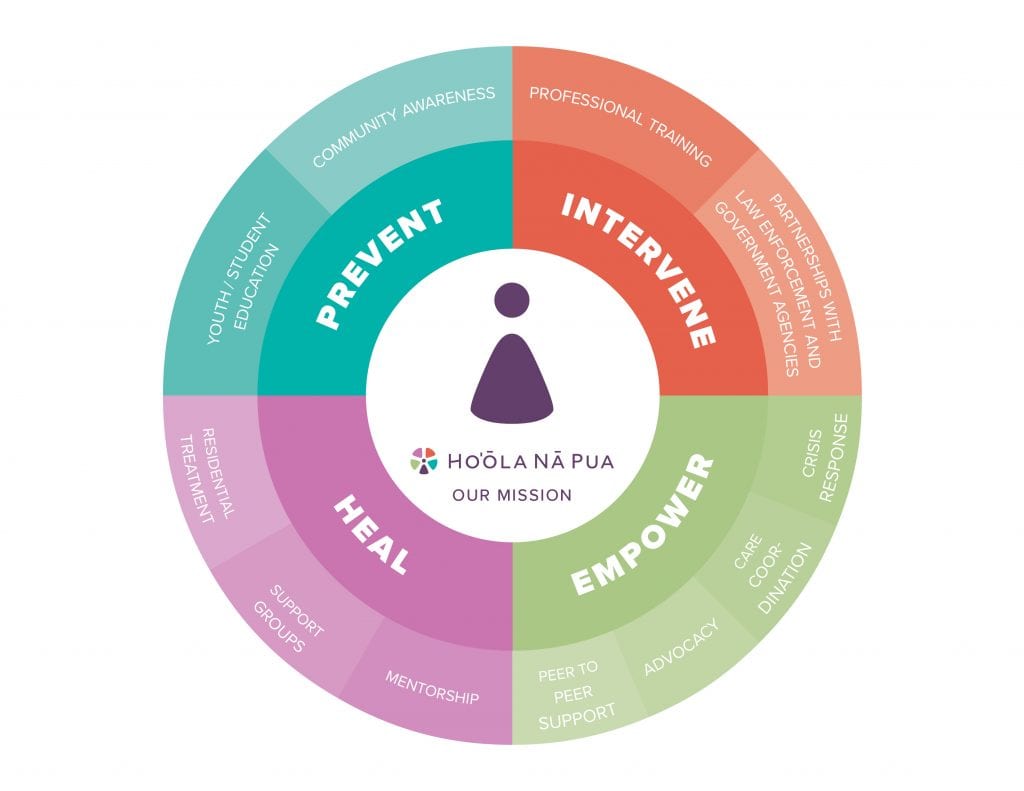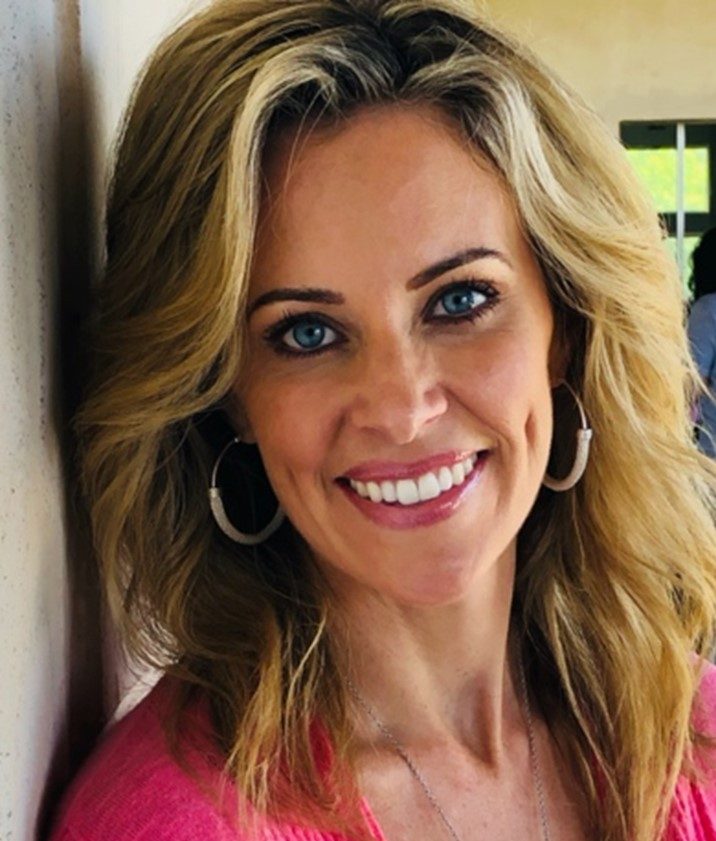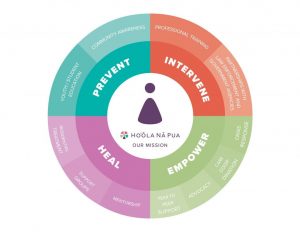Interview with Ho`ōla Nā Pua on Their Mission to End Sex Trafficking
 Jessica R. Munoz is a clinical emergency nurse practitioner, and president and founder of Hoʻōla Nā Pua Pua (HNP) which means “New life for our children“, a nonprofit organization whose mission is the prevention of child sex trafficking and providing care for youth who have been exploited. Rooted on the “justice gene in her DNA”, her passion for shining the light in the dark places and watching new life come forth shapes her vision and life’s mission.
Jessica R. Munoz is a clinical emergency nurse practitioner, and president and founder of Hoʻōla Nā Pua Pua (HNP) which means “New life for our children“, a nonprofit organization whose mission is the prevention of child sex trafficking and providing care for youth who have been exploited. Rooted on the “justice gene in her DNA”, her passion for shining the light in the dark places and watching new life come forth shapes her vision and life’s mission.
She provides executive leadership, innovation, and development of a growing social service agency. She has 15 years of health care experience, entrepreneurship, and community advocacy, transformational systems change, and leadership.
Over the past 12 years she has published articles, provided training and strategies on identification, intervention, and response for hundreds of health care professionals, service providers, law enforcement, and community leaders. She works closely with the judiciary, district attorneys, and state, federal, and local law enforcement to help shape a multi-disciplinary collaborative response to trafficked youth and young adults in Hawaii.
Since 2009, Jessica and her team have been driving the anti-trafficking movement in the Hawaiian Islands and the Pacific. Her passion to serve exploited children and her pursuit of comprehensive understanding of their needs has fostered her role as a trainer and advisor in Cameroon, Africa with Vital Voices Global Partnership. She has also provided training on trauma informed survivor centered care and building Multi- disciplinary teams in Samoa, Cambodia, Africa, and Thailand. She has also provided services, training, and medical care in Guatemala and Mexico.
Through her work, Jessica has emphasized the continuum of care and the Response Framework needed for underage trafficking victims through collaborative, health centric, trauma-informed systems and victim-centered approaches and partnerships. One of her core initiatives has been to open Pearl Haven— Hawaii’s first residential treatment campus for sexually exploited teenage girls.
Of note, she and her team worked with CBS and the executive producers of the TV show Hawaii Five-0 to bring awareness through their March 10th, 2017 episode Puka ‘Ana or “exodus” which highlights the issue of child sex trafficking in Hawaii and the work being done by the organization. This episode had over 8.9 million viewers and multiple PSA’s created by the cast to help spread awareness.
“Exploitation and abuse thrive in secrecy and shame. The more connected we are in raising the level of the conversation, the greater our impact will be in decreasing the stigma around this issue across all demographics and socioeconomic sectors. Together, we can shine the light and ignite the chain reaction required to end exploitation.” ~ JRM
Over 4 million people sex trafficked every year and over 1 million of them are children…
3 out of 4 victims knew their trafficker…
64% of trafficking victims identified as being native Hawaiian…
http://https://youtu.be/gD348MNbl5c
Please tell us more about how you are tackling this issue of sex trafficking. I learned the organization takes an intersectional approach, which includes prevention, intervention, healing, and empowerment, to address this issue. Can you share more about that and how it works?
Jessica Munoz: I’m a nurse practitioner, and therefore I look at everything through a public health lens. And when you look at how to approach something, you look at it through the three tiers of prevention. So, you have primary prevention, secondary and tertiary prevention, and especially with the issue of trafficking it’s imperative to not only stop things upstream but provide acute intervention services to those who’ve been victimized.
When we look at how we want to change the system as a whole, you have to look at it from that those three spheres of prevention. If you want to see sustainable, transformational change, you have to address the core root of why trafficking thrives as an enterprise of cause and demand – it’s a business. Without understanding that infrastructure, the cycle will never be broken. We must be prepared to respond with a continuum of care for both victims and at-risk youth through a licensed residential treatment center offering programs that can provide case management, trauma-informed care coordination, and advocacy for healthy reintegration of exploited youth.
We have to address a very dark and troubling question…who is buying sex, especially from kids and why? How do we stop a criminal enterprise that thrives on selling innocence? We have to peel back layers to look at the crisis comprehensively. When we work with various government agencies, like the child welfare system, the juvenile justice system, the foster care system, there are elements within each of those systems that unfortunately fail those they are designed to protect. The crisis is so robust, that kids can inadvertently slip through the cracks of care because the system can miss key risk factors – especially in young children, when we don’t take the time to recognize complex trauma which can lead to devastating vulnerability preyed upon by traffickers.
How did you become aware that this was such a prevalent issue, in the US and specifically in the state you work in, Hawaii?
Jessica Munoz: 12 years ago, I was working in the emergency room as a nurse, and I started seeing kids come into our emergency room and we weren’t recognizing them as victims of exploitation. And oftentimes they’re labeled as delinquents, runaway substance users. And yet the reality is they’re being trafficked and exploited. And so at the time when you would call social services or law enforcement, there wasn’t really a response. Most of the response was “this isn’t happening here, what are you talking about?” My background in pediatric trauma is what spurred me to engage in this advocacy work. I was shocked that no one had told me that children were bought and sold for sex every day…right here in America.
I started on an education front, wanting to make sure all healthcare professionals were trained and educated on the issue, in the same way that I had to be educated on the reality of trafficking. But I quickly realized, there’s so much needed to change the system in order to correct the problem. You need programming that is specific to kids who’ve been exploited. But then also you have to close the gaps and create that continuum of care so that kids can ultimately find their path to restoration freedom, renewal, empowerment, and healing. One of the things that I saw early on was the fact that there was no comprehensive residential treatment programming for kids who had been trafficked. When I first started this work in 2009, there were 50 beds for kids who had been trafficked in the United States of America.
Today, there are less than 600 residential treatment beds for youth who have been trafficked.
That void in the response-solution prompted a vision to build a place called PEARL HAVEN, here in the State of Hawaii, which is opening this month, as a comprehensive residential treatment center specifically designed to support a continuum of care addressing the complex needs of adolescent girls who have been trafficked or exploited. PEARL HAVEN is the first residential program offering education, prevention, mentoring, advocacy, group, resiliency and family therapy all of which are designed to support healthy community reintegration for youth to find their purpose-filled futures.
What are some things that other organizations can adopt from your approach and then also what other organizations are out there that also tackle this issue from a different perspective.
Jessica Munoz: For more than 12 years, my personal mantra and calling has been to “shine the light in the darkness and watch life come forward”. One of the things that I found is that the more we talk about the issue, the more people want engage in a response. There is finally an awakening, an awareness, taking place in our once quiet society around this crisis. As a result, Ho`ōla Nā Pua has been able to mobilize community advocacy and unique partnerships that are really starting to make a difference…believe me when I say protecting innocence must start at home and then with the eyes and ears to see those in need within our communities.
There are emerging organizations that deal with law and policy changes on a national and international level. Some organizations focus on intervention, some on rescue efforts, and a few on aftercare. Here in Hawaii, we only have a couple of entities that are specific to doing anti-trafficking work. Nationally, there is notable movement towards lawful policy change because part of what can make our work difficult in the US is that there are so many rules and regulations, especially working with minors. Since this is such a unique population, this response requires out of the box thinking, planning, and intervention.
In the US while we have the Communications Decency Act (CDA), there are still significant changes that need to happen because of the virtual world we now live in. Of note is that under the Covid-19 pandemic mandate to stay home, one may think, we were safer…but with the extent of virtual dependency for learning, working, socializing, consumerism and entertainment we have become that much more vulnerable and desensitized as a population…especially our children.
Online trafficking has surged in demand amid this pandemic because more kids are online at home, and often unsupervised. Trafficking perpetrators aren’t the ‘scary guys who crawl out from under the bridge’ they’re actually within in your home – virtually – by way of smart devices, computers, two-way cameras, social media, chat rooms and kids don’t realize who they are actually talking to. It’s a violation against the vulnerable on so many levels…it’s a dark criminal enterprise masked online.
What are some things that other organizations can adopt from your approach and then also what other organizations are out there that also tackle this issue from a different perspective.
Jessica Munoz: For more than 12 years, my personal mantra and calling has been to “shine the light in the darkness and watch life come forward”. One of the things that I found is that the more we talk about the issue, the more people want engage in a response. There is finally an awakening, an awareness, taking place in our once quiet society around this crisis. As a result, Ho`ōla Nā Pua has been able to mobilize community advocacy and unique partnerships that are really starting to make a difference…believe me when I say protecting innocence must start at home and then with the eyes and ears to see those in need within our communities.
There are emerging organizations that deal with law and policy changes on a national and international level. Some organizations focus on intervention, some on rescue efforts, and a few on aftercare. Here in Hawaii, we only have a couple of entities that are specific to doing anti-trafficking work. Nationally, there is notable movement towards lawful policy change because part of what can make our work difficult in the US is that there are so many rules and regulations, especially working with minors. Since this is such a unique population, this response requires out of the box thinking, planning, and intervention.
In the US while we have the Communications Decency Act (CDA), there are still significant changes that need to happen because of the virtual world we now live in. Of note is that under the Covid-19 pandemic mandate to stay home, one may think, we were safer…but with the extent of virtual dependency for learning, working, socializing, consumerism and entertainment we have become that much more vulnerable and desensitized as a population…especially our children.
Online trafficking has surged in demand amid this pandemic because more kids are online at home, and often unsupervised. Trafficking perpetrators aren’t the ‘scary guys who crawl out from under the bridge’ they’re actually within in your home – virtually – by way of smart devices, computers, two-way cameras, social media, chat rooms and kids don’t realize who they are actually talking to. It’s a violation against the vulnerable on so many levels…it’s a dark criminal enterprise masked online.
What were some of the challenges and pushback you faced when starting HNP and today?
Jessica Munoz: The trafficking crisis is not easy nor pleasant to talk about. Appropriately there is an aversion to the topic – because of its horrors – but that very avoidance is part of the problem. If I go to a cocktail party and people say, “Oh, what do you do?” I usually lead with the fact that I’m a nurse. People don’t want to accept the fact that children are bought and sold for sex. And that we, as a society, would somehow condone that behavior. Yet, the sexualization of women began generations ago – we’ve been conditioned to normalize the patterns and sadly, that blind indifference has subliminally transferred to the objectivation of children.
People have a hard time believing trafficking happens in the United States of America and to ‘American children’. It’s somehow easier to assume it’s a foreign country or third-world crisis which is what we see in mainstream media – the headlines, the container, the episodic series…but the fact that over a hundred-thousand kids are trafficked every year in our civilized malls, parks, schools should awaken every citizen to advocate for a zero-tolerance policy to protect our children…our future.
One of the challenges we face, especially in Hawaii, is cultural coding or barriers. What happens in the family stays in the family. You do not bring shame upon a home or a family member. The idea of honor can easily supersede the need for honesty. We have to be intentional in how we address the island’s trafficking pandemic to present the issue in a way that’s palatable for people to be willing to take a stand starting at home. That’s one of the reasons why our PSA campaign is presented in a relatable, storytelling format, if not for one viewer to pause and consider their own environment.
We have to tell the story of these kids and of this situation, but also be careful to no alienate the viewer who can easily shut down, turn it off, look away and continue to avoid a difficult reality. I do a lot of speaking, and one of the things I notice is that I can say the word “child” a hundred times during a speaking engagement and afterwards people will come up to me and say, “Isn’t it so sad, what happens to those women?” And I ask them, “You mean children?” It’s very hard to come to terms with the fact that humanity, especially adults, would do this to kids…the brain wants to block that reality, and part of our job in this work, is to unblock that denial and replace it with awareness and advocacy.
Up until a year or so ago even national exposure had an aversion to engage the issue. The combination of movements like Times Up, Me Too and the Epstein expose changed the conversation about the crisis because stereotypes were chattered and a society saw that power, wealth, popularity are also deeply intertwined in the dark criminal enterprise of sex trafficking. There are societal constructs that do not want this issue to stop because they are profiting billions in revenue from human trafficking.
You mentioned that making videos helps with getting this message out. What made you realize that there was a need for videos in general, and how has that helped with your mission?
Jessica Munoz: Our intentionally crafted PSA videos bring visibility to those silently suffering…those who feel invisible. They also make visible, an invisible issue to most people. Visual depictions advocating around this issue do exist, but most are not an accurate portrayal of trafficking in the United States. Like all businesses trends, patterns, identities change and the same holds true for trafficking, so how we present the issue within education and advocacy materials must also change. For example, the default belief is that a child gets kidnapped and then they get trafficked, while that certainly occurs, it is not the most prevalent form of intake. 90% of trafficking comes from a trusted relationship where one is coerced or conned into doing something that they never intended to do – that material, or behavior is then compromised, sold and the manipulation, fear and shame traps the victim until their psychology succumbs to a degree of acceptance of what is expected of them.
Therefore, we really wanted to paint the picture of what it looks like for a child to be approached online, that this person tends to present themselves as a friend and pretends to love and care about them. Then it quickly turns into a situation of exploitation versus a van kidnapping. In 2017, CBS dedicated a Hawaii Five-0 episode to our organization and the work we do around this issue. We were able to depict how the crisis looks in the islands. From that collaboration, we had 9 million viewers see trafficking in an entirely different light. It was a game changer and I am so grateful to the showrunners, cast and network for having the courage to tell that story when very few would.
Are the videos and media more targeted towards general audiences who need to learn more about the topic at hand or the victim themselves and realizing they are in a situation?
Jessica Munoz: We’ve done both. Amid the pandemic we created two PSAs with our creative partners at Sight and Sound Productions Hawaii: one called “It Could Be You” and one called “Faces”. They were geared towards: you could be a victim and not know it.
Ho’ōla Nā Pua 24/7 Helpline for Referrals and Support: (808) 435-9555. Videos and photographs courtesy of Ho’ōla Nā Pua and Sight and Sound Productions.
What are some of Ho`ōla Nā Pua’s results, especially those that you’re most proud of.
Jessica Munoz: When I think about where we started 12 years ago, I’m most proud of the team that we’ve put together. We were all a hundred percent volunteer driven at the beginning and built this organization from nothing to what it is today and now we are opening our multi-million-dollar residential treatment center campus, Pearl Haven. It took us years of resiliency to develop, build, and garner support for this center. When I look at our community partners, agency cooperative efforts, the openness to have these conversations and the rising advocacy to see this crisis end, I am humbled at the role HNP plays to create a safer community for our children. There is a lot of work still to do, but there is progress and I am encouraged by the hope I see in Hawaii.
We are also putting Hawaii on the map, addressing the issue from a holistic perspective, which is a very rare approach in the US. I’m proud to be at the forefront of pioneering this comprehensive development of trauma-informed and trauma-responsive programming so that we can better understand how to work with those who’ve been victimized. This is still a huge area that needs a lot of development and research because we just haven’t studied it enough. Especially for children who’ve been trafficked – in the aftercare – how do we provide sustainable and transformative pathways to their individual successes.
What have you learned throughout your entire experience, and also your experience specifically with Pearl Haven and creating that kind of a space.
Jessica Munoz: I’ve learned it takes a lot of grit and perseverance, and I’ve also learned that no, doesn’t always mean no most of the time. It means not yet. I’ve had to learn to be very patient and understand that it’s all about timing with everything we’ve done to conference vital conversations that need to be had, and not rushing those and allowing them to happen in the right timing. I’ve had to learn how to slow down and how to really listen to people. Whether it’s the survivors we work with, whether it’s staff, whether it’s donors, whether it’s community members and especially given the sensitivity around this issue. I’ve learned how to not overload people with too much information at one time because it isn’t common for most people to hear about these topics.
Over the years I definitely had a lot of people say that I was crazy for doing this. Yet you have to hold fast to the truth that you know is in your heart. For me, it’s a calling grounded in my faith in God, and most of my commitment has come from my obedience to Him and what He has called me to do.
That’s wonderful. I know you mentioned that Pearl Haven is opening this month, tell us a little bit more about what else is in the future for HNP and what you will need to achieve those things.
Jessica Munoz: Pearl Haven opens this month, a place where kids from anywhere across the United States could be sent for treatment and care. In addition to that, we want to see growth in our mentoring and advocacy programs. We’re currently operating on two islands: Oahu and Hawai’i Island. We would love to add Maui and Kauai to our HNP network. We want to be able to get our prevention, education, professional training, mentoring and advocacy going on each Island. We also see the need for even more awareness around not only just the issue as a whole, but truly the need for this new approach of continuum of care for those exploited.
We want to have a voice on the national forefront since we are pioneering so much of this new and progressive public health model. That means continuing to have those conversations. Hawaii is the most remote Island chain in the world; it’s the farthest from any landmass. So, we’re trying to build that bridge across the ocean so that we are tracking with the rest of the United States. We could also help be one of the leaders, especially when it comes to the aftercare of kids who’ve been exploited.
To get there obviously it is going to require a lot of resources and capacity. We look to the private sector and family foundations to get behind what we’re doing and that it really doesn’t matter where you’re located because children are trafficked everywhere and this is a national issue. Therefore, by investing in the work being done by organizations such as ours, you are helping change the future of generations to come and the future of this issue in the United States, which will expand around the globe.
For Ho`ōla Nā Pua, our name means new life for our children, every youth we serve will have our support for as long as they allow us. We are here for them. It’s a lifelong journey with these kids.
What concerns you about the world? What gives you hope?
When I think about what concerns me in the world, my heart breaks for people who are walking in fear, sadness, depression, anxiety, and lack of an absolute truth. When I think about the kids that we serve and the kids that we work with, they are so resilient and we want to give them hope and joy and a future and teach them to play again and to have fun and to really know who they are and where their value and worth comes from and where their identity can be grounded. It gives me hope that you can take such a desperate and heart-wrenching situation and still give them something to hope for.
Ho’ōla Nā Pua 24/7 Helpline for Referrals and Support: (808) 435-9555. Videos and photographs courtesy of Ho’ōla Nā Pua and Sight and Sound Productions. To learn more about Ho’ōla Nā Pua, visit https://hoolanapua.org/.






Got something to say?